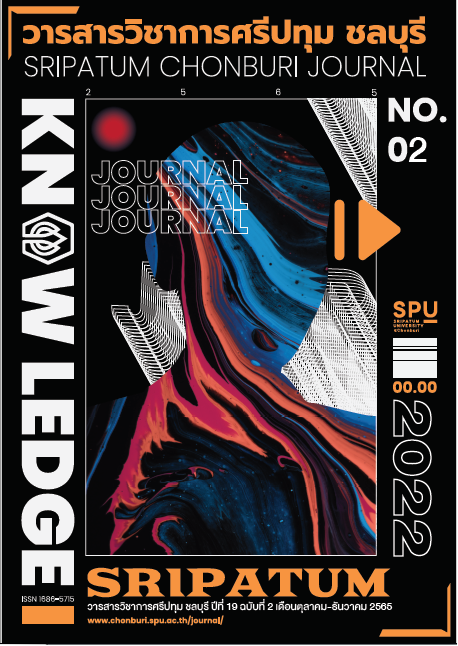การพัฒนากิจกรรมทดสอบหน้าที่บริหารจัดการสมองสำหรับเด็กปฐมวัย
Keywords:
หน้าที่บริหารจัดการสมอง, กิจกรรมทดสอบ, เด็กปฐมวัยAbstract
การวิจัยจะมีคำถามเกี่ยวกับกิจกรรมความรับผิดชอบของสมองสำหรับเด็กปฐมวัยและการศึกษาเพิ่มเติมเกี่ยวกับกิจกรรมการทดสอบหน้าที่ครูฝึกสมองสำหรับเด็กปฐมวัยซึ่งเป็นตัวอย่างการทดสอบปฐมวัยที่มีช่วงอายุระหว่าง 5-6 ปี ปี จำนวน 30 คน ทบทวนบทเรียนก่อนแบบคัดกรองกลุ่มตัวอย่าง ประเมินความฉลาดทางอารมณ์ รายวิชาที่ต้องตรวจสอบ ถามสมองมาตรฐาน (PEBL-64) ตามมาทดสอบฟังก์ชันการทำงานเผื่อสมองสำหรับอะตอมอาวุโส สถิติของห้องปฏิบัติการวิเคราะห์ข้อมูลจากการวิเคราะห์ความตรงเชิงเนื้อหา นักวิเคราะห์สัมประสิทธิ์สหสัมพันธ์ (ความตรงเชิงบรรยากาศ) และวิเคราะห์ค่าความเที่ยงตรงแบบความสอดคล้องภายใน KR-20
ผลการวิจัยพบการทดสอบ หน้าที่ความรับผิดชอบของครูฝึกสมองสำหรับเด็กปฐมวัย สิ่งเหล่านี้เป็นกิจกรรมต่างๆ ของรูปแบบสัตว์ที่ช่วยให้ได้ลองดูอิโมจิและเครื่องหมายถูกหรือผิดในบางครั้งของการทดสอบครั้งเมื่อทำ เมื่อทำการทดสอบเสร็จแล้วจะได้รู้ผลทันที เมื่อทำการทดสอบแล้วอย่าลืมฟังคำสั่งสำหรับสมองสำหรับปฐมวัยได้สิ่งนี้ มีค่าความตรงเชิงเนื้อหาคือ S-CVI/Ave = .95 และจะมีตรงเชิงเชิงเปรียบเทียบของกิจกรรมที่ทดสอบหน้าที่ ไตรมาสที่ 2 แบบมาตรฐาน (PBCST-64) เหลือค่าความเที่ยงตรงแบบความสอดคล้องภายใน KR-20 คือ .72
References
กนิษฐา เรืองวรรณศักดิ์, นิติ นิมะลา และอภิรักษ์ อุ่นไธสง. (2559). การออกแบบสื่อการสอนในการเตรียมความพร้อมสู่ประชาคมอาเซียน ประเภทของเล่น
เสริมพัฒนาการเรียนรู้สำหรับเด็กปฐมวัย. วารสารวิจัยและพัฒนา มหาวิทยาลัยราชภัฏสวนสุนันทา, 8(1), หน้า 6-20.
นวลจันทร์ จุฑาภักดีกุล, ปนัดดา ธนเศรษฐกร, อรพินท์ เลิศอวัสดาตระกูล และนุชนาฏ รักษี. (2559). รายงานวิจัยการพัฒนาและหาค่าเกณฑ์มาตรฐาน
เครื่องมือประเมินการคิดเชิงบริหารในเด็กปฐมวัย. ศูนย์วิจัยประสาทวิทยา สถาบันชีววิทยาศาสตร์โมเลกุล และสถาบันแห่งชาติเพื่อพัฒนาเด็กและ
ครอบครัว, กรุงเทพฯ: มหาวิทยาลัยมหิดล.
พรรณทิพย์ ศิริวรรณบุศย์. (2553). ทฤษฎีจิตวิทยาพัฒนาการ (พิมพ์ครั้งที่ 5). กรุงเทพฯ: สำนักพิมพ์แห่งจุฬาลงกรณ์มหาวิทยาลัย.
วนิดา กาบสุวรรณ, สมนึก ภัททิยธนี และสุวิมล โพธิ์กลิ่น. (2559). การสร้างแบบทดสอบวัดความพร้อมด้านอารมณ์-จิตใจ และสังคม สําหรับเด็กปฐมวัย
ชั้นอุบาลปีที่ 2 สังกัดสํานักงานเขตพื้นที่การศึกษาประถมศึกษามหาสารคาม เขต 1. วารสารการวัดผลการศึกษา มหาวิทยาลัยมหาสารคาม, 22(2),
หน้า 283-294.
Anderson, S. W., Damasio, H., Jones, R. D., & Tranel, D. (1991). Wisconsin Card Sorting Test Performance as a Measure of Frontal
Lobe Damage. Journal of Clinical and Experimental Neuropsychology, 13(6), pp. 909-922.
Blair, C. (2016). Executive Function and Early Childhood Education. Journal of Current Opinion in Behaveioral Sciences Issues,
, pp. 102-107.
Coldren, Jeffrey T. (2013). Cognitive Control Predicts Academic Achievement in Kindergarten Children. Mind Brain and
Education, 7(1), pp. 40-48.
Gregory, R. J. (2015). Psychological Testing History, Principles, and Applications (7th ed). Edinburgh Gate, Harlow, UK:Pearson
Education.
Gonzalez-Hernandez, J. A., Cedeno, I., Pita-Alcorta, C., Galan, L., Aubert, E., & Figueredo-Rodriguez, P. (2003). Induced
Oscillations and The Distributed Cortical Sources During the Wisconsin Card Sorting Test Performance in Patients: New Clues
to Neural Connectivity. International Journal of Psychophysiology, 48(1), pp.11–24.
Mathôt, S., Schreij, D., & Theeuwes, J. (2012). OpenSesame: An Open-Source, Graphical Experiment Builder for The Social
Sciences. Behavior Research Methods, 44(2), pp. 314-324. doi:10.3758/s13428-011-0168-7.
Miyake, A., Friedman, N. P., Emerson, M. J., Witzki, A. H., Howerter, A., & Wager, T. D. (2000). The Unity and Diversity of
Executive Functions and Their Contributions to Complex “Frontal Lobe” Tasks: A Latent Variable Analysis. Cognitive
Psychology, 41(1), pp. 49-100.
Mueller, S. T., & Piper, B. J. (2014). The Psychology Experiment Building Language (PEBL) and PEBL Test Battery. Journal of
Neuroscience Methods, 222, pp. 250-259.
Downloads
Published
Issue
Section
License
Copyright (c) 2022 วารสารวิชาการศรีปทุม ชลบุรี Sripatum Chonburi Journal

This work is licensed under a Creative Commons Attribution-NonCommercial-NoDerivatives 4.0 International License.
บทความทุกบทความเป็นลิขสิทธิ์ของวารสารวิชาการศรีปทุม ชลบุรี



